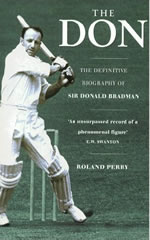The Don
Stuart Wark |Published: 1995
Pages: 645
Author: Perry, Roland
Publisher: Pan Macmillan
Rating: 2.5 stars

The Don, first published in 1998, boldly claims up-front to be the definitive biography of Bradman. This is an ambitious claim, as it is said that there are more books dedicated to the life of Bradman than any other Australian. Bradman himself wrote a number of books including Don Bradman’s Book – The Story of My Cricketing Life with Hints on Batting, Bowling and Fielding, My Cricketing Life, Farewell to Cricket, and The Art of Cricket. Other notable works include A.G. Moyes’ Bradman, Michael Page’s Bradman – The Illustrated Biography, Irving Rosenwater’s Sir Donald Bradman – A Biography, Charles Williams’ Bradman: An Australian Hero, Alan Eason’s The A-Z of Bradman, Brett Hutchins’ Don Bradman: Challenging the Myth, and Christine Wallace’s The Private Don just to name a few. With that much competition, The Don needed to provide something unique in an attempt to distinguish it from the crowd. The spin in this case was the fact that Perry claimed to have gained access to both Bradman’s writings and collections, but also his personal thoughts.
Perry, a journalist and documentary maker turned his hand to writing works of fiction in the late 70s. His novel, Program for a Puppet, was sufficiently successful that Perry took to writing full-time. His works since that time have included political books about the Regan administration, biographies of miliary commander Sir John Monash and famous cricketers such as Steve Waugh and Shane Warne, as well as a series of books featuring Bradman’s name somewhere in the title.
This book covers Bradman’s cricketing career in great detail. The descriptions of the games are well done, and largely marry with what is already on public record. The focus is naturally upon Bradman’s contribution to the game, and his huge public appeal. Perry does cover the impact of Bradman well, and how vital he was not just to Australian cricket, but to the success of the game world-wide. Unfortunately, there is little information in there that is new, or which provides the reader with insight into how Bradman thought.
Writing a biography about a legend is always tricky. If you cover them warts and all, the public may become disillusioned. However, if you fail to dig deeply enough, there is also fair cause for readers to complain about a lack of honesty by an obsequious author. It is even harder to achieve a balance when the person in question has already been the subject of numerous other books, and the reader is probably already reasonably familiar with the individual’s life story. Sadly, Perry falls squarely into the sycophantic camp, failing to provide an even handed approach to the biography. Bradman was not a demi-god; he was human and had human failings like all of us. However, Perry’s initial version of this book carried almost no words of criticism or even referred to any personal weaknesses at all. Rather, Perry seems to almost delight in trying to downplay and ridicule any person who ever had the temerity to disagree with Bradman. After Bradman died, Perry did revise the work slightly, largely in response to significant criticism about this failing.
Whilst it was Perry’s first book about cricket, I actually read The Don after previously reading other books by Perry including his biography of Steve Waugh and Captain Australia. On face value, Perry’s books are interesting to read, however, I became concerned whilst first reading Captain Australia with Perry’s failure to include any research notes, references, index or even a simple bibliography. In an autobiography this is forgivable, however, when Perry makes many claims in his books to events or actions that have never been mentioned elsewhere, the flaw is inexcusable. My concerns were first raised in Captain Australia, when Perry refers to a meeting between Dave Gregory and Fred Spofforth just prior to Spofforth pulling out of what became the first ever Test match. This meeting has never been documented in any standard reference works, and when I discussed it with descendents of Dave Gregory, they were certain it never happened. With no corroborating evidence cited and no references provided, and in light of contradictory information from reliable sources, it would appear that Perry may have simply made it up to suit his own purposes. There are other examples in which Perry cuts quotes, thus changing the meaning completely. In the light of these concerns, it is hard not to be slightly sceptical about any new information that Perry brings forth in relation to Bradman.
The Don is certainly a readable book, and deserves its place as part of the overall literature regarding Bradman. However, my personal view is that there are other biographies that better capture the essence of who Don Bradman really was. That is, after all, the point of any biography; this books struggles because what should have been a balanced reflection of the individual became a forum to simply provide reverential homage to Bradman’s undeniable greatness as a cricketer. Interesting, but ultimately lacking in substance.






Leave a comment